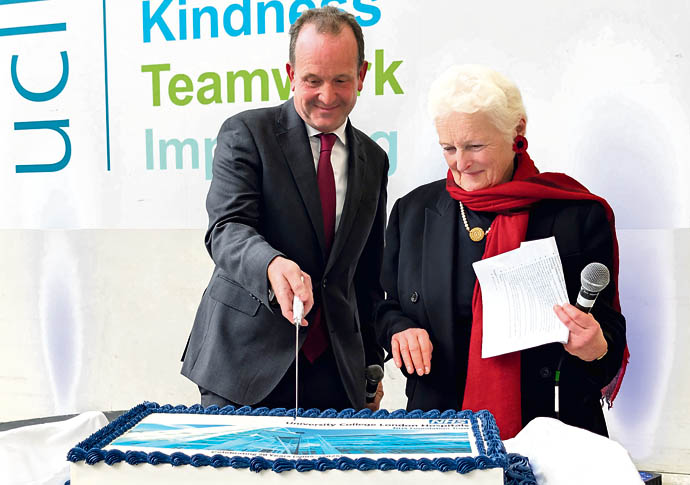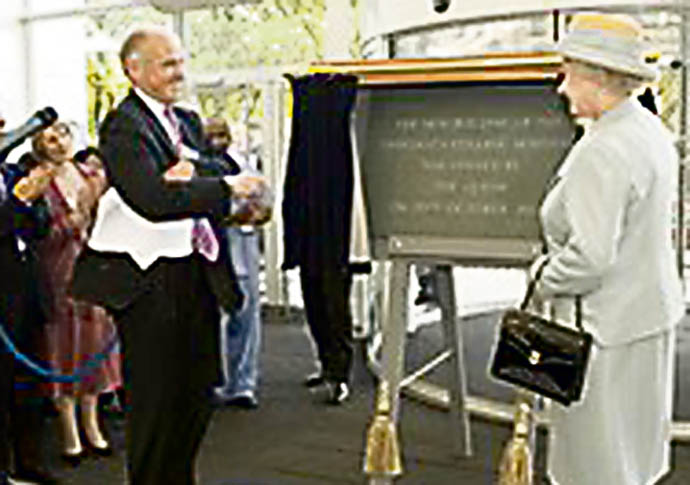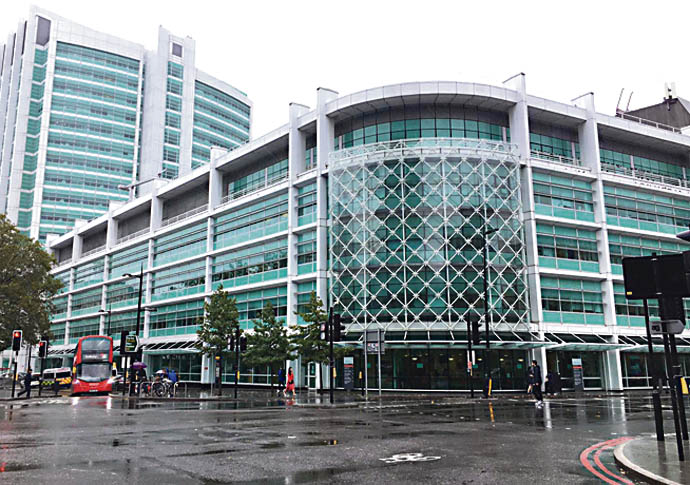It’s 20 years of world class hospital care (and 20 years of mega cash PFI profits)
We have lots to thank UCLH for in its first 20 years of life-saving care and innovation, but could it have achieved even more if it had not been saddled with PFI obligations? Tom Foot investigates
Friday, 10th October 2025 — By Tom Foot

Chief executive David Probert and Baroness Julia Neuberger at the 20th anniversary celebrations at UCLH
UNIVERSITY College London Hospitals has marked the 20th anniversary since it was officially opened by the late Queen Elizabeth II.
Over the years, it has consistently maintained its position as one of the world’s top healthcare providers and just last month it was named as the highest ranked teaching hospital in the country.
But it is not just the hard working NHS staff in Euston Road that were celebrating with a well-earned toast to the past, present and future.
So too is the private equity group that has made £462million in pre-tax profit since the hospital opened, with more than £250million paid out to its shareholders from profits taken directly from the budgets of UCLH NHS Trust over the same period.
Last year alone, £18.4million was paid out to shareholders of the Health Management UCLH (HMU) Plc.
“The directors consider the results for the year to be satisfactory,” its most recent annual accounts published in June said.
Campaigners have told the Tribune that it is an “outlier” and among the most profitable Private Finance Initiative (PFI) schemes ever set up in this country – and there are still 15 years left on the contract.
David Rowlands, director of Centre for Health and the Public Interest, is among the critics of PFI to provide hospital facilities and outsourcing.
He told the Tribune: “The UCLH PFI scheme has generated eye watering profits for shareholders and investors at the expense of NHS patients and the workforce. The amount generated in profits by the companies (£462 million) now exceeds the £422 million that it originally cost to build the hospital with more profits set to come. Last year, the company which owns the PFI hospital and leases it back to the Trust made an astonishing 75 per cent margin from the income it received under the contract.

Queen Elizabeth opens the doors in 2005
“Losing this vast amount of money to PFI profits over the last 20 years has undoubtedly had a huge negative impact on the workforce and the care of sick Londoners.”
The HMU consortium was formed in 2000 as part of the get-now-pay-later style system used for creating new public buildings.
It was a key plank of the “New Labour” government’s economic policy, the idea of PFI was to get private firms and big banks to finance construction and maintenance of a raft of new hospitals and also schools. Crucially, spending was passed onto the private sector keeping it off the public’s sectors books.
In return, the consortium’s shareholders were assured of making large returns in deals fixed for as long as 40 years.
At UCLH the annual repayments were agreed to be £27.8m, rising with interest. This means that the recent inflationary increases, which saw utility bills and supermarket costs surge, has had a punishing effect. This year’s payment to the consortium is expected to be in the region of £50 million – money that will not be going on relieving the long waiting lists for appointments and care.
Union chiefs have recently warned that 200 nursing posts may be threatened at UCLH in a new round of cutbacks.
Last month the Department for Health confirmed it had begun “market testing sessions” about a programme of private funding for 200 new healthcare centres and a decision is expected to be announced in the coming November budget.
Johnbosco Nwogo, lead campaigner at We Own It campaign group, said: “The government appears to be making the same kind of mistake that John Major and Tony Blair made in the past. It just a callous decision for the NHS, whichever way you slice it.”

And he called on the government to launch a review into all of the current PFI contracts with NHS trusts, telling the New Journal: “We are needing money right now for the NHS. One option is to look again at these contracts.”
Mr Nwogo said his figures showed that by the end of the UCLH PFI contract, in 2040, the NHS would have spent £2.6 billion in return for a £283m investment.
The UCLH PFI was initially a consortium of firms including banking giant Credit Suisse, investment firm Semperian, Interserve – which manages maintenance at the hospital – and Dalmore Capital.
It has since 2012 been owned 75 percent by UCLH Investors Limited and 25 percent by Semperian PPP Holdings Ltd, both based in Bristol. In 2040, the payments will end and the then 35 year-old hospital will become fully owned by UCLH NHS Trust.
Apart from funding the general maintenance of the hospital facilities, the PFI company has also paid for series of “major projects”.
In 2024, these included a new bereavement suite in the Elizabeth Garrett Anderson wing, door replacement and new “anti ligature curtain rails” across the wards.
Despite these outlays, HMU has posted sizeable profits each year. The after tax dividend to shareholders in 2024 was agreed at £18.4m, compared to £15.5m for 2023.
A report to the most recent meeting of the trust’s board said the increases in payments had not been matched by increases in funding from central government, adding: “As in the last three financial years inflationary pressures, particularly in the energy markets and in relation to PFI costs, continued to exceed funded inflation.”
In 2019, UCLH trust held an internal review that said it would save at least £30m a year if it was allowed to buy out its PFI contract. This idea was blocked by the Treasury due to concerns about mounting public sector debt.
In 2021, the former UCLH chief executive Marcel Levi said in an outgoing interview that the PFI set up was “as a crazy system, a stupid system”.
A UCLH spokesperson said: “University College Hospital was one of the earlier private finance initiative hospitals to open in the UK in 2005. Later PFI hospital contracts were negotiated differently based upon the learning from early projects.
“We support the current work of the NHS and government to explore what role private finance could play in future. We would like to see new estates in the NHS which provide value for money for the taxpayer, particularly given the current limitations on public capital funding for the NHS.”
HMU, now based in Bristol, does not have a website or obvious contact details and neither does “UCLH Investors”.
Semperian did not respond to queries from the Tribune.
List of annual profits made by HMU since UCLH opened
2024: £36,434,000; 2023: £32,075,000; 2022: £30,155,000; 2021: £28,874,000; 2020: £28,852,000; 2019: £28,211,000; 2018: £27,306,000; 2017: £24,753,000; 2016: £25,031,000; 2015: £26,550,000; 2014: £26,524,000; 2013: £25,739,000; 2012: £22,027,000; 2011: £19,818,000; 2010: £19,045,000; 2009: £16,329,000; 2008: £11,915,000; 2007: £11,254,000; 2006: £9,144,000
• The Tribune news team knows not every reader will have the time or interest to read a page-long investigation into how hospital PFI contracts work for private companies – and for most local papers, this would simply be a happy picture story of a 20th-anniversary celebration. But London needs journalists digging deeper and asking questions about how public services are run on all our behalf and how shared resources are used. The best way to help us do this is to support our journalism into the future with an online subscription service at newjournal.substack.com. Thank you to everybody who has done so already.